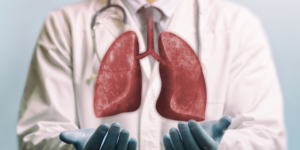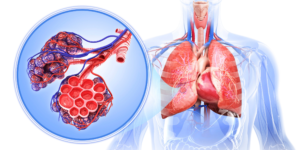
Your lungs are amazing and incredibly hard-working organs. But they are not immune to the passage of time. As you age, so do your lungs, and it’s helpful to understand how your lungs change, what’s natural, and what could be a signal that you need to talk to your doctor.

First, let’s remind you about the lungs function.” Your lungs are part of your respiratory system, a group of organs and tissues that work together to help you breathe. Lungs have two main functions: to get oxygen from the air into the body and to remove carbon dioxide from the body. The oxygen helps fuel your body’s functions, and carbon dioxide gas is a waste product your body produces when it uses oxygen. Your lungs are filled with millions of air sacs, called alveoli, where these gasses pass between the bloodstream and the airways.
As you age, changes affect your lung tissue, muscles and bones, which all impact your breathing. The maximum amount of air your lungs can hold is about six liters. That is about three large soda bottles. Your lungs mature by the time you are about 20-25 years old. After about 35, their function declines as you age and as a result, breathing can slowly become more difficult over time. In a person without lung disease, most of these changes are due to cardiovascular and muscle changes, not changes to the lungs themselves.

As you age, changes affect your lung tissue, muscles and bones, which all impact your breathing. The maximum amount of air your lungs can hold—your total lung capacity—is about six liters. That is about three large soda bottles. Your lungs mature by the time you are about 20-25 years old. After about 35, their function declines as you age and as a result, breathing can slowly become more difficult over time. In a person without lung disease, most of these changes are due to cardiovascular and muscle changes, not changes to the lungs themselves.
- There are several body changes that happen as you get older that may cause a decline in lung capacity: Alveoli can lose their shape and become baggy.
- The diaphragm can, over time, become weaker, decreasing the ability to inhale and exhale.
- This change will only be significant when exercising.
At birth, the lungs are pinkish white in color; in adult life the color is a dark grey, mottled in patches; and as age advances, this mottling assumes a black color. The coloring matter consists of granules of a carbonaceous substance deposited in the areolar tissue near the surface of the organ. It increases in quantity as age advances, and is more abundant in males than in females. As a rule, the posterior border of the lung is darker than the anterior.
Avoid smoking, exercise more frequently, do meditation and deep breathing exercises to support your lungs as you age and enjoy every breathe!!
